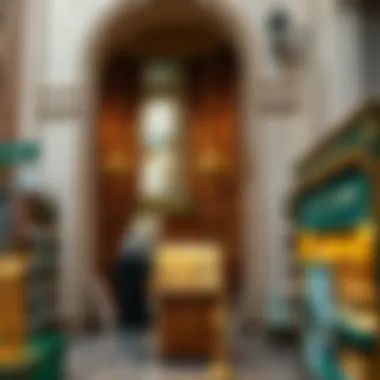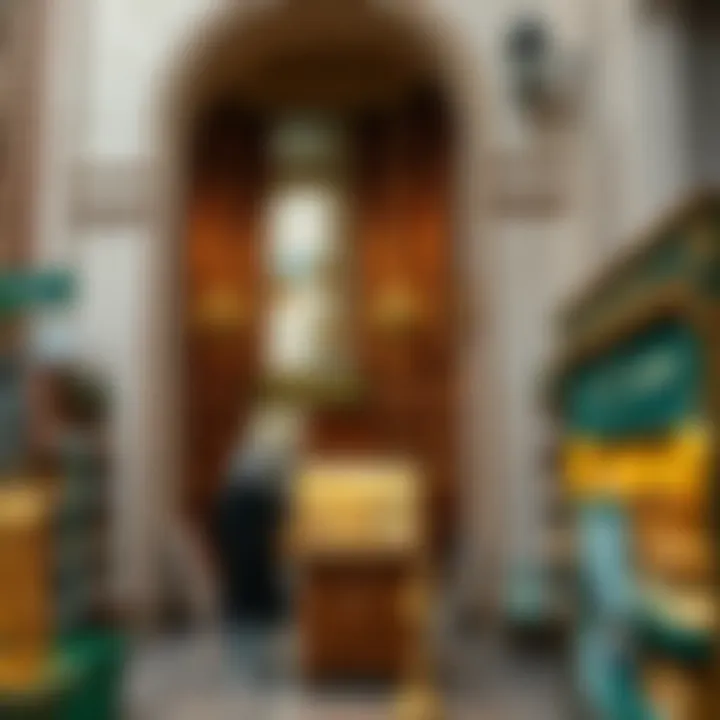Exploring Dubai's Gold Sook: Culture and Commerce


Intro
Navigating the bustling streets of Dubai, one encounters a marketplace that glistens brighter than the polished gold itself. The Gold Sook is not just a commercial hub; it's an intrinsic part of Dubai's rich cultural tapestry. Steeped in history yet continually in tune with modern market dynamics, this iconic market is a compelling realm for both seasoned investors and curious tourists alike.
In this space, gold acts as more than a commodity. It represents a form of investment, a status symbol, and a traditional art form. This article probes deeply into the Gold Sook, unraveling its past and present, examining its vital role in the emirate's thriving economy.
With a finger on the pulse of current market trends, coupled with a keen eye on investment opportunities, this guide aims to equip you with the knowledge and insights needed to make informed decisions in this glittering arena.
From the intricate designs of traditional jewelry to modern trading practices, understanding the Gold Sook opens a window into Dubai’s commercial identity. Let's delve deeper into the market trends and investment opportunities that lie within this dazzling marketplace.
Historical Background of the Gold Sook
The Gold Sook holds a significant place in the tapestry of Dubai's marketplace, reflecting not only the region's economic roots but also its cultural heritage. To truly grasp the essence of the Gold Sook, it is essential to explore its origins and evolution, as well as its cultural significance within Dubai. This historical backdrop lays the foundation for understanding the marketplace's current dynamics and its role in the modern economy.
Origins and Evolution
The origins of the Gold Sook can be traced back to centuries ago when Dubai was a modest fishing village and trade port. In its early phases, gold was not only a form of currency but also a representation of wealth and status. The discovery of oil in the mid-20th century transformed the city from a quiet town into a bustling metropolis, which ushered in a new era for gold trading.
As trade continued to flourish, the need for a centralized marketplace became apparent. Thus, the Gold Sook emerged as a vibrant hub for traders, both local and international. Initially, artisans crafted jewelry using traditional techniques, showcasing intricate designs that reflected the Islamic culture. Over time, as the demand for gold grew, the Sook expanded, featuring hundreds of shops ranging from small family-owned establishments to larger, more opulent retailers.
Today, the Gold Sook is a sprawling arena of business, with more than 300 retailers offering a variety of products, such as gold bars, coins, and luxurious jewelry. Customization options are widely available, allowing customers to design unique pieces that reflect their personal heritage and style. This evolution of the Gold Sook from a traditional market to a modern trading hub illustrates its resilience and adaptability within a rapidly changing economy.
Cultural Significance in Dubai
Dubai's Gold Sook is not merely a marketplace; it embodies cultural values and social norms that have shaped the emirate over decades. Gold has long been regarded as a symbol of prosperity, and for many families, it plays a pivotal role in important life events, such as weddings and celebrations. The tradition of gifting gold during these occasions is deeply rooted in the local culture, serving as a tangible expression of love and commitment.
Moreover, the Sook showcases the Emirati hospitality and social fabric. It is common for families to visit the Gold Sook together, wrapped in a sense of pride as they explore their heritage through precious metals. The lively atmosphere, echoing with the sounds of bargaining and chatter, creates a welcoming environment that reflects the unity within the community.
The Gold Sook's cultural significance extends beyond just commerce; it illustrates Dubai's journey towards global recognition. Tourists flock to this bright, bustling market to experience authentic Emirati culture while seeking unique treasures. Thus, the Gold Sook remains a vital link not only between the past and present but also between the local community and the broader global society.
"Gold is more than just a metal; it’s a reflection of our history and a bridge to our future."
Through understanding the historical background of the Gold Sook, one can appreciate its integral role in Dubai's narrative. As it stands today, the Sook is a continuous testament to the evolution of trade, cultural values, and the city itself, offering valuable insights for investors, buyers, traders, and anyone intrigued by the interplay of commerce and culture.
Market Structure of the Gold Sook
The Gold Sook is not just a hub for trading precious metals; it's a finely tuned marketplace that operates on several interconnected layers. Understanding the market structure of the Gold Sook is essential for investors, buyers, agents, and developers alike. It plays a pivotal role in how trading is conducted, what products are available, and how various stakeholders interact with one another. This section dissects the types of gold products available and highlights the key players and stakeholders that shape this bustling marketplace.
Types of Gold Products Available
In the Gold Sook, the array of gold products available is impressively diverse. These offerings aren't merely for show; they symbolize wealth and cultural significance, appealing to both local and international buyers. The main categories include:
- Gold Jewelry: This is often the crown jewel of the marketplace. Pieces range from intricately designed wedding sets to simple yet elegant chains and pendants. Each piece tells a story and often carries cultural weight.
- Gold Bullion: For those investing seriously, bars or coins are common. These pure gold items are traded based on weight and purity, making them a safe haven for investors during volatile times.
- Gold Souvenirs: Unique items crafted for tourists, such as ornate trinkets or decorative gold-plated pieces, are available. They are not just souvenirs but investment pieces too, often appreciated in value over time.
Role of Gold in the Economy
Gold is often depicted as much more than a mere shiny metal. It serves a cornerstone function in the economy of Dubai, influencing numerous sectors including trade, investments, and even local culture. The economic relevance of gold cannot be overstated; its value is not confined simply to its luster but extends to its role as a secure asset and the influences it has on real estate and investment decisions in the region.
Gold as a Safe Haven Asset
Gold has a well-earned reputation as a safe haven asset. Investors often flock to gold during tumultuous times in financial markets. This is particularly evident in Dubai, where geopolitical instability in surrounding areas or fluctuations in oil prices can make gold an attractive option for preserving wealth.
- Why is gold valued in uncertain times?
Gold is tangible, universally recognized, and, importantly, liquid, meaning it can be quickly converted to cash. In a rapidly changing market, many prefer holding gold rather than stocks or bonds, which may experience more volatility. Investors see gold as a hedge against inflation, currency devaluation, and economic downturns. - Implications for Dubai's Economy:
In Dubai, the central location and the tax-free environment enable the gold market to thrive. When investors view gold as a safe asset, the influx of wealth can boost local spending, thus creating a ripple effect in various sectors, including luxury goods and services. This further solidifies the Gold Sook's status as a major marketplace.


"In Dubai, gold isn't just a commodity; it's a sentence written in the language of wealth—navigating through history and future alike."
Impact on Real Estate Investments
The relationship between gold and real estate in Dubai reflects a complex interplay of market conditions and investor sentiment. As gold prices fluctuate, so too does the interest in property investments. Simply put, stable or rising gold prices can encourage potential investors to shift their focus from conservative savings to riskier, but potentially rewarding, real estate ventures.
- Liquidity and Investments:
When gold prices rise, it often leads to higher liquidity for investors, allowing them the flexibility to pursue other investments. The wealth realized from gold can be funneled into purchasing properties, which in turn contributes to the booming real estate market in Dubai. Areas like Dubai Marina or Downtown Dubai see this effect, where luxury apartments attract buyers eager to invest their gold gains. - Market Trends:
Analysts frequently concur that as gold becomes more expensive, there’s often a correlated rise in demand for high-end property. Some investors believe in investing in real estate as a way to store value, much like their holdings in gold. This creates a symbiotic relationship; the more gold is valued, the higher the stakes in real estate become.
In summary, gold serves multiple roles within Dubai's economy, acting as a safe haven for investments and significantly influencing the real estate dynamics. Understanding these connections is crucial for anyone looking to navigate the market, whether they are seasoned investors or newcomers.
Legal Framework Governing Gold Trading
The legal framework surrounding gold trading in Dubai is not just a list of rules; it's the bedrock that ensures the market operates smoothly while protecting all parties involved. Understanding these regulations is crucial not only for traders but also for potential buyers, investors, and even tourists. The framework provides a structure to the bustling marketplace and helps maintain its reputation as a safe place for high-value transactions.
Key elements like licensing, taxation, and trade standards contribute significantly to establishing a transparent environment. Traders must comply with these laws to gain the trust of clients, and this compliance often translates into a competitive edge. Trust is key in transactions involving such precious commodities. Furthermore, every law that governs gold trading often has implications extending into consumer behavior, market reputation, and investor confidence.
Regulations and Compliance
Regulations in Dubai's gold trading sector are enforced through agencies like the Dubai Multi Commodities Centre (DMCC). These regulations cover a wide range of aspects:
- Licensing Requirements: Every dealer operating in the Gold Sook must acquire a valid license from the DMCC, ensuring that only authorized traders partake in the marketplace.
- Quality Standards: Gold products must comply with internationally recognized quality standards. This includes the hallmarking of gold, verifying the purity and quality customers can trust.
- Taxation Policies: Traders in the Gold Sook face specific tax regulations that delineate the obligations of businesses, impacting the overall pricing strategy.
Adhering to these regulations not only protects traders from legal repercussions but also enhances their credibility with buyers.
Consumer Protection Laws
The vibrant market for gold in Dubai also comes with robust consumer protection laws tailored to safeguard the interests of buyers. These laws are designed to create a fair trading environment where consumers can pursue their purchases with confidence.
Key features of these laws include:
- Right to Information: Consumers must receive clear and comprehensive information regarding the products they are buying, including the purity, weight, and value of the gold. This is crucial for maintaining transparency within the market.
- Returns and Guarantees: Many vendors provide a guarantee on their products, allowing consumers to return any item that does not meet their satisfaction. This creates an additional layer of trust between buyers and sellers.
- Dispute Resolution Mechanisms: Should conflicts arise, the law provides pathways for dispute resolution that help consumers and traders resolve issues amicably.
These consumer protection laws are essential in a marketplace where large sums of money are at stake. They build a level of trust vital for continued consumer interest and participation in the gold market.
In summary, understanding the legal framework governing gold trading is paramount for anyone involved in the Gold Sook, from investors to everyday buyers. By navigating the regulatory landscape properly, both traders and consumers can enjoy a secure, transparent, and thriving marketplace.
Consumer Behavior in the Gold Market
Understanding the consumer behavior in the Gold Sook is pivotal for grasping the dynamics of this marketplace. Investors, buyers, and traders are influenced by a mix of cultural traditions, economic conditions, and personal motivations. This portion delves into the patterns that shape purchasing decisions and the demographics involved in gold buying.
Demographics of Gold Buyers
Gold buyers in Dubai vary widely. Expats make up a significant portion of the market, seeking not just gold as an investment but also as a form of wealth preservation. According to a study, around 85% of gold purchases are made by expatriates. These buyers come from diverse backgrounds, primarily from India, Pakistan, and the Middle East, each bringing their own traditions regarding gold.
- Age and Gender: The age demographic of gold buyers tends to skew towards adults aged 30-55. Traditionally, women have been the primary buyers, especially for jewelry and gifting, while men often invest in physical bullion.
- Cultural Influence: Many buyers are driven by cultural beliefs. For instance, in Indian culture, gold jewelry symbolizes prosperity and is integral to wedding ceremonies. Similarly, in Arab culture, gold is a status symbol, often gifted during significant life events.
- Economic Status: Buyers range from everyday consumers to high-net-worth individuals. Those with disposable income often view gold as a way to diversify investments and protect against inflation.
Trends in Gold Purchasing Patterns
In recent years, gold purchasing patterns have evolved, reflecting changing global economics and consumer preferences.
- Shift Towards Online Shopping: The pandemic accelerated the trend of online gold purchasing, with many dealers offering e-commerce platforms. Consumers appreciate the convenience and the ability to compare prices without stepping outside.
- Investment Gold: There is a noticeable upturn in the interest for investment-grade gold, such as bullion bars and coins. Many buyers are now seeing gold less as an ornamental item and more as a strategic asset.
- Sustainability Consideration: A rising number of consumers, particularly millennials, are becoming conscious of the ethical implications of gold mining. As a result, more buyers are seeking assurance from sellers regarding the ethical sourcing of gold.
The market is increasingly shaped not just by the allure of gold but also by the motivations and values of the buyers, making understanding their behavior crucial for success in this sector.
In summary, demographic diversity and evolving purchasing trends significantly shape the Gold Sook’s marketplace. Recognizing these factors can lead to better strategies for reaching potential customers and enhancing sales in this dynamic environment.


Challenges Faced by Gold Traders
The landscape of gold trading in Dubai's Gold Sook, while vibrant, is not devoid of hurdles. Understanding the challenges faced by gold traders is vital as it sheds light on the dynamics that influence this marketplace and, by extension, the global gold trade. Traders encounter several issues, from unexpected price fluctuations to the threat of counterfeit products, all of which can erode profit margins and consumer trust. Recognizing these challenges can not only help investors make informed decisions but also provide insights on how to mitigate risks associated with buying and selling gold.
Market Volatility and Pricing Issues
Gold is often considered a safe haven investment—yet, its price can be akin to a roller coaster ride. In Dubai, traders watch the gold prices with hawk-like attentiveness. Factors such as geopolitical tensions, currency fluctuations, and changes in demand all contribute to the unpredictable nature of gold prices. For instance, when uncertainties grip the world economy, demand for gold often spikes, driving prices up. On the other hand, economic stability can lead to decreased demand, causing prices to dip.
This volatility means traders must be savvy; they can't simply buy low and sell high. They need to understand market signals and anticipate how world events might impact pricing. Additionally, maintaining transparent pricing during negotiations becomes essential. Without clear pricing strategies, traders risk losing customers who might wander into the competition.
A few key factors that impact market pricing include:
- Global Economic Indicators: Changes in interest rates, inflation rates, and even employment data can sway gold prices.
- Geopolitical Events: Wars, conflicts, and diplomatic tensions tend to increase gold's allure.
- Currency Strength: The value of the US dollar is inversely related to gold prices; a stronger dollar often leads to lower gold prices.
"Understanding market fluctuations is not just about charts; it’s about being in tune with global events that ripple through the economy."
Counterfeit Gold Products
Counterfeiting has become a pressing issue in the Gold Sook, where the sparkle of gold can sometimes mask deception. For gold traders, it’s imperative to ensure the authenticity of the products they offer. Counterfeit gold can run the gamut from plated items to entirely fabricated pieces designed to fool even some of the most discerning buyers. Such schemes can tarnish the reputation of otherwise reputable traders, affecting sales and customer loyalty.
The presence of counterfeit products not only puts traders at risk but also consumers, creating a climate of uncertainty. Buyers might often find themselves questioning the authenticity of their purchase. The stakes are high because buying faux gold can lead to significant financial loss.
Here’s how traders can navigate this perilous landscape:
- Invest in Gold Testing Equipment: Tools such as acid tests and electronic testers help determine a product's authenticity—knowledge is power.
- Collaborate with Certified Assayers: A partnership with reputable assayers provides an additional layer of trust for consumers.
- Educate Consumers: Equipping them with knowledge about identifying genuine gold—such as hallmark checks—fuels confidence.
Gold Sook and Tourism
The Gold Sook serves not only as a marketplace for precious metals but also as a significant aspect of Dubai's tourism landscape. This vibrant hub attracts countless visitors eager to experience its blend of luxury, culture, and commerce. With its atmoshpere buzzing with energy, the market offers a sensory feast; from the glimmering gold jewelry displays to the sounds of haggling and laughter. Tourists come away with not just items but the pleasure of an unforgettable experience that links them to the heart of Emirati tradition.
Moreover, the Gold Sook functions as a cultural bridge, connecting travelers to the heritage of Dubai—showcasing craftsmanship that has been passed down through generations. Visitors often find themselves immersed in conversations with local artisans who share stories about the artistry involved in their creations. This element of tourism transforms the Sook into more than just a shopping destination; it becomes a space of cultural exchange and learning.
"The Gold Sook is where commerce meets culture, making it a must-see for any visitor to Dubai."
Attraction to Visitors
The sheer allure of the Gold Sook is a magnetic force for tourists from all walks of life. As they step into the market, visitors are often captivated by the visual spectacle that surrounds them. Intricately designed gold pieces catch the light and dazzle the eyes. Shoppers can find everything from traditional Emirati jewelry to contemporary designs, catering to diverse tastes. The thrill of bargaining, a prevalent practice in many Middle Eastern markets, adds an element of excitement.
An added draw is the often favorable price point. Prices in the Gold Sook tend to be competitive, particularly for international travelers. The absence of tax on gold purchases in Dubai further enhances its appeal, making it a haven for jewelry enthusiasts and savvy buyers alike. This aspect ties directly to the city’s status as a luxury shopping paradise, positioning the Gold Sook as an essential stop in any Dubai itinerary.
Local vs. International Buyers
In analyzing the purchasing behaviors of both local and international buyers at the Gold Sook, distinct patterns emerge. Local customers typically gravitate towards traditional pieces that carry cultural significance, such as taweez and qabbalah, which are not only beautiful but steeped in meaning. Their purchases are often linked to personal celebrations, such as weddings or festivals where gold jewelry is a staple.
On the other hand, international buyers come to the Gold Sook with a different mindset. Tourists frequently seek unique souvenirs that capture the essence of Dubai. They may be drawn to distinctive designs that reflect the cultural mosaic of the Emirates. Many international visitors approach their shopping experience as both a cultural exploration and investment opportunity, recognizing the value of gold which often appreciates over time.
Understanding these varying perspectives helps traders in the Gold Sook tailor their offerings. Active engagement with both groups ensures that the marketplace remains dynamic and relevant, thus sustaining its status as a top-tier tourist destination. As such, the Gold Sook is not just a location for transactions but an ongoing narrative of how market interactions reflect broader sociocultural dynamics in Dubai.
Sustainability Issues in Gold Mining
Sustainability in gold mining isn't just a buzzword; it’s turning into a cornerstone for the industry—particularly as the spotlight grows brighter on how gold is sourced and the environmental footprint of its production. In the context of the Gold Sook in Dubai, focusing on sustainable practices can enhance the market's reputation and attract conscientious consumers. As the world increasingly prioritizes ethical consumption, understanding sustainability issues in gold mining becomes essential for investors, buyers, and sellers alike.
Ethical Sourcing of Gold


The concept of ethical sourcing extends beyond a mere marketing tagline; it encompasses a commitment to responsible practices throughout the gold supply chain. Ethical sourcing of gold aims to ensure that the metals are mined without causing harm to communities and ecosystems. In Dubai's Gold Sook, where luxurious jewelry and investment-grade gold are the primary offerings, consumers are becoming more knowledgeable about where their gold comes from and the methods involved in obtaining it.
Gold sourced from environmentally and socially responsible mines can attract buyers who are concerned about human rights and environmental degradation. Ovally cutting across international lines, organizations like the Responsible Jewellery Council (RJC) promote these practices and provide certification to companies that adhere to sustainable standards. This transparency builds trust among customers, driving the demand for ethically sourced gold.
"Investors and consumers can amplify their impact by actively choosing to purchase ethical gold, thereby supporting sustainable mining practices that benefit communities and protect the planet."
Moreover, the integration of sustainable practices into the gold business increases operational efficiency and reduces waste. In Dubai, sellers who can demonstrate ethical sourcing might gain a competitive edge in the market as more customers reflect on their purchasing choices.
Environmental Impacts of Gold Mining
Gold mining has long been associated with significant environmental challenges. From deforestation and soil degradation to the contamination of water sources, the negative environmental impacts of gold mining are numerous. As we dive deeper into the topic, it's crucial to outline how these operations affect the landscape and resources available.
- Pollution: The use of toxic chemicals such as cyanide in mining not only threatens local wildlife but also poses risks to communities dependent on nearby water sources. These heavy pollutants can migrate, creating a far-reaching impact on health and biodiversity.
- Waste Generation: Gold mining operations commonly produce vast amounts of waste material. Tailings, which are byproducts of the mining process, must be managed carefully to minimize their impact on surrounding environments.
- Habitat Loss: Large-scale mining can lead to critical loss of habitat for numerous species. This loss may disrupt local ecosystems and biodiversity, pushing species to the brink of extinction. The environmental footprint leaves irreversible marks that often do not heal quickly.
As stakeholders in the Gold Sook reflect on their sourcing practices, awareness around these issues is gaining traction. Increasing regulation and public scrutiny around environmental impacts pressurizes mining companies to adopt greener practices, such as reduced chemical usage and effective waste management systems.
In summary, prioritizing sustainability in gold mining isn't simply a good practice—it's becoming a necessary strategy for survival in a market that is progressively leaning toward environmentally and socially responsible options.
Future Outlook of the Gold Market
The future of the gold market holds great significance for those involved in the financial landscape of Dubai and beyond. This arena is dynamic, where the tides of global economics and local market behaviors beget a constantly shifting environment. Gold is not simply a commodity; it is a cornerstone of wealth preservation and investment strategy, particularly in uncertain times. Given these factors, understanding the outlook for the gold market is vital for buyers, investors, agents, and developers alike.
Predicted Market Trends
As we look ahead, several trends are emerging in the gold market that could influence its trajectory.
- Increased Demand from Emerging Markets: Countries like China and India, with their growing middle classes, continue to show robust demand for gold jewelry and investment. This trend presents a ripe opportunity for those looking to invest.
- Digitization of Gold Trading: The advent of blockchain technology has potential implications for increasing transparency in gold transactions. Platforms that leverage decentralized ledgers can help mitigate risks related to fraud, thus gaining traction among newer investors.
- Economic Uncertainty: Factors such as inflation, geopolitical tensions, and fluctuations in currency value typically play a pivotal role in gold prices. During volatile periods, many investors flock to gold as a safe haven.
- Sustainability Concerns: Today's investors are increasingly factoring in ethical sourcing and the environmental impact of gold mining. This focus on sustainability could lead to innovations in how gold is mined and traded, potentially affecting market dynamics.
"Gold is the only asset that has stood the test of time despite economic turbulence."
Overall, the trends indicate a shifting landscape where technology and ethical concerns intersect with traditional investment principles. Investors may need to stay agile, adapting strategies to align with these developments.
Emerging Investment Opportunities
Several investment opportunities are arising from the evolving gold market. Recognizing these can provide strategic openings for wise investors. Some noteworthy opportunities include:
- Gold ETFs: Exchange-Traded Funds that focus on gold can be a convenient means for investors to challenge exposure without physical possession. This method removes storage concerns and is gaining traction among modern investors.
- Numismatic Coins: Collectible coins can yield significant returns. These can appreciate in value, particularly if they are rare or have historical importance. This niche market perpetuates interest from collectors and investors alike.
- Gold Mining Stocks: Investing in companies engaged in gold mining can provide leveraged exposure to gold prices. If prices increase, these stocks often respond positively, enhancing the investor's returns.
- Peer-to-Peer Lending for Gold: New platforms are emerging that allow individuals to lend gold as collateral. This could present a unique investment avenue where both parties benefit.
These opportunities point toward a diverse set of pathways in a market that is becoming increasingly complex. Investors should conduct due diligence and adapt their strategies, keeping in mind market shifts and consumer behaviors.
The landscape of the gold market is ripe with potential, and understanding these trends can serve as a valuable roadmap for navigating the future.
Epilogue and Key Takeaways
The conclusion of this article distills everything we've explored about the Gold Sook, providing a clear view of its multifaceted role in both Dubai's economy and the global gold market. This section serves as the cornerstone for potential investors, local businesses, and casual observers interested in grasping how the Gold Sook operates amidst a blend of tradition and modern enhancements.
Recapitulation of Insights
When diving into the depths of the Gold Sook, several crucial insights emerge:
- Historical Roots: Understanding the Gold Sook requires an appreciation of its rich history, rooted in centuries of trade and cultural significance. Its transformation reflects broader social and economic changes in Dubai.
- Economic Role: This market is not just a storefront of shiny baubles but acts as a barometer for economic conditions in the region. Investors often observe gold prices here to gauge local and global economic health, which can influence their investment decisions.
- Legal Landscape: The nuances of regulations impacting gold trading in Dubai are crucial. Anyone considering participation in this market should familiarize themselves with compliance requirements to ensure safe and legal transactions.
- Consumer Behavior: Different buyers show varying preferences in terms of styles, investment versus personal use, and demographic tendencies. Recognizing these patterns can offer insights into potential market movements and opportunities for new investors.
This recapitulation highlights the significance of both qualitative and quantitative elements that inform actual trading approaches within the Gold Sook.
Final Thoughts on Investing in Gold
Considering investing in gold, whether through the Gold Sook or other venues, necessitates a strategic approach. Here are several factors for prospective investors to keep in mind:
- Market Timing: Prices of gold fluctuate quite frequently due to market dynamics, geopolitical tensions, and other economic indicators. A keen understanding of these factors can enhance one’s chances of making profitable decisions.
- Diversification: Gold should not be the sole component of an investment portfolio. Incorporating a mix of asset classes can mitigate risks associated with market volatility.
- Ethical Considerations: Today’s investors are increasingly mindful of where their gold comes from. Engaging with suppliers that adhere to ethical mining practices not only promotes sustainability but also aligns with evolving consumer expectations.
- Long-Term Perspective: Investing in gold is often seen as a long-term wealth preservation strategy. Therefore, investors should be prepared to hold onto their investments through market ups and downs rather than acting on short-term fluctuations.
As we look toward the future of gold investment, it remains a robust option for hedge against uncertainty and a way to anchor one’s portfolio amid shifting economic tides.







